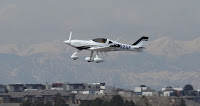The four-seat eFlyer - with a maximum fly time of four hours - could take to the skies by 2021.
When the pilot guides the electric airplane from its hangar, there is only a light whirring of propellers instead of the roar of an engine. And it leaves no exhaust in its wake as it takes off from a small air strip south of Denver. The small plane, the eFlyer, is the first all-electric plane to seek FAA certification and its builders hope it will revolutionize the aviation industry as the first commercial electric airplane.
“Electric motors are not new,” said George Bye, President of Bye Aerospace and the airplane’s creator. “But the application to airplanes is remarkable, and until recently most people thought it was impossible.”
Bye, who started working to develop the plane 12 years ago, said it took a transformation in battery and engine technology to make the eFlyer possible. While cars have long been able to carry heavy batteries and engines, airplanes must be aerodynamic and light. Bye completed his design once batteries and electric engines became small enough. The eFlyer is the first all-electric airplane to enter an FAA certification program, and the first eFlyers could take to the skies as early as 2021.
Training pilots, draining carbon
Bye initially designed the electric plane after learning of a growing commercial airline pilot shortage. He thought the eFlyer could cut down on expensive fuel costs for flight school training. But in addition to breaking down barriers to entry for new pilots, electric planes could one day make the aviation industry much friendlier to the environment.
Electric airplanes ‘not only possible, but it’s revolutionary.’ – Bye Aerospace creator
Personal cars drive the conversation about transportation’s impact on climate change, but some estimate that an airplane flight could be 50 times worse for the climate than a car driven the same distance. Airplanes, like cars, release carbon dioxide, but each flight also releases nitrogen oxides, water vapor, and particulates that can contribute to global warming. When released at high altitude these other emissions usually amount to more than half of a plane trip’s contribution to climate change.
Despite the environmental impacts of aviation, the industry has been largely left out of the conversation about electric vehicles, primarily because of technological limitations. The FAA would not even consider electric airplanes for airworthiness until 2017. The eFlyer, though only a small plane for flight training, could start to change that conversation.
“We are showing that this is not only possible, but it’s revolutionary,” said Bye.
Read more at A Small Electric Plane Demonstrates Promise, Obstacles of Climate-Friendly Air Travel

No comments:
Post a Comment